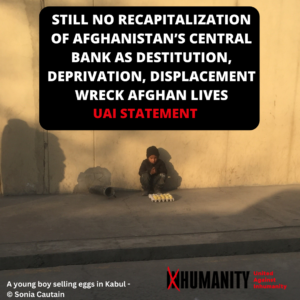Informal discussions with diverse interlocutors show that there is inadequate awareness of the significance of Common Article 1 (CA1) in terms of the opportunities it provides for individuals and civil society actors to engage in efforts that challenge unregulated warfare and the harm and suffering it entails for civilians in to-day’s war zones. As noted last August in a UAI paper on this topic, all States are obligated to “respect and ensure respect” of longstanding humanitarian norms concerned with upholding the safety, protected status and dignity of civilians.
“Act Today, Shape Tomorrow” was the theme of the recent (December 2019) Red Cross Conference that, since 1867, meets in Geneva every four years. It brings together State parties to the Geneva Conventions and the global Red Cross, Red Crescent movement. ICRC President, Peter Maurer, noted that the Conference was a unique opportunity to “discuss critical humanitarian challenges with governments” and he expressed appreciation for their committed to tackle “the new challenges emerging on the world’s frontlines”; these are included in resolutions summarised in an official press release.
Unfortunately, as noted in a New Humanitarian article focused on an interview with Peter Maurer who acknowledged some frustration with States, the ICRC “scaled back its ambitions” as past attempts to generate a mechanism to enhance “compliance with IHL had foundered.” It transpires that the obligation inherent in CA1 “to ensure respect” is, now, a contentious battlefield where a battalion of lawyers from the United States delegation “successfully negotiated to remove the words ‘ensure respect’ from a draft resolution” arguing that the ICRC’s interpretation was becoming too expansive.
Various delegates noted that, in the past, it was easier to achieve consensus on resolutions that one government representative described as “anodyne”. It is also noteworthy that the debate geared to strengthening the application of international humanitarian law is among States that have adopted IHL treaties and, by extension, agreed to deliver on their responsibilities. The experience of this Red Cross conference is but one example of the important role which citizens can play in pushing their governments and, where relevant, non-state armed groups to uphold the sanctity of core humanitarian norms.
In October 2019 the Overseas Development Institute (ODI) kindly posted a blog by Norah Niland “Inhumanity unlimited: should citizens acquiesce or object” that UAI also cross-posted. Also in October 2019, UAI together with 15 other NGOs, co-signed a letter to UK Foreign Secretary Dominic Raab on the protection of civilians in armed conflict. At UAI’s suggestion, the letter makes specific reference to the importance of promoting compliance by all states with Common Article 1 of the four Geneva Conventions, which requires states not only to comply with International Humanitarian Law, but also to ensure respect by other states. Opinion pieces by IEC members have also called attention to UAI’s ‘Call to Action’ and encouraged readers to illustrate their concern by signing it.
As part of UAI’s ongoing efforts to reach out to interested individuals and entities everywhere, a section on Common Article 1 was created on the UAI website. Reflections are also underway on the utility of establishing an Affiliated Group on CA1; forward movement on this is dependent on level of interest in different locations. Various UAI initiatives on CA1 are being planned, including a public event at Rome University.











